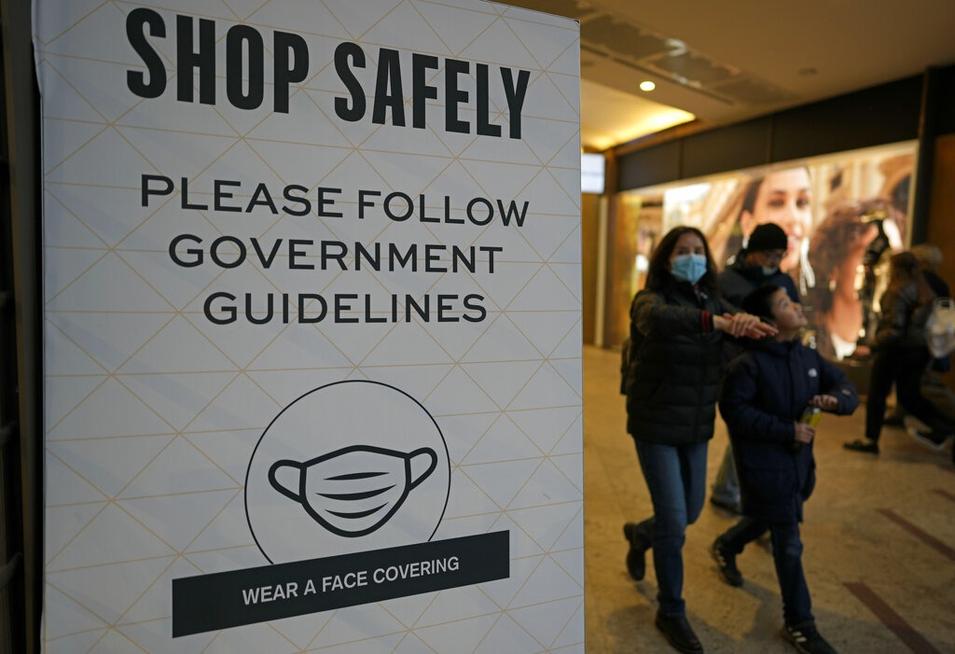 People walk past a sign outlining COVID-19 guidelines in the center of Amsterdam, the Netherlands on Dec 18, 2021. (PETER DEJONG / AP)
People walk past a sign outlining COVID-19 guidelines in the center of Amsterdam, the Netherlands on Dec 18, 2021. (PETER DEJONG / AP)
GENEVA / THE HAGUE / KYIV / PARIS / BERLIN / LONDON / NICOSIA / CAIRO / BRAZZAVILLE / HAVANA / OTTAWA / AMSTERDAM - Shopping streets in the Netherlands were closed and people's Christmas plans were in disarray as the country began a lockdown on Sunday aimed at limiting an expected COVID-19 surge caused by the rise of the Omicron variant.
Prime Minister Mark Rutte announced the sudden shut-down on Saturday evening, ordering the closure of all but the most essential stores, as well as restaurants, hairdressers, gyms, museums and other public places from Sunday until at least Jan 14.
All schools will close a week early for the Christmas break on Monday and will remain shut until at least Jan 9, while households are recommended to receive no more than two visitors and gatherings outside are also limited to a maximum of two
The news came as a shock to many Dutch people as they headed into the Christmas and New Year period. Many people rushed out on Saturday to stock up on presents and food and to get a last-minute haircut.
Hospitality workers demanded compensation for lost income in the holiday season, while gym owners stressed the importance of exercise during a health crisis.
"Closing all bars and restaurants in such an important month is incredibly painful and dramatic. We need compensation and an exit strategy", the Dutch association for hospitality services said.
All schools will close a week early for the Christmas break on Monday and will remain shut until at least Jan 9, while households are recommended to receive no more than two visitors and gatherings outside are also limited to a maximum of two.
Coronavirus infections in the Netherlands have dropped from record levels in recent weeks after a night-time lockdown was put in place late last month. But cases involving the Omicron variant have increased rapidly since the beginning of December and the strain is expected to become dominant before the end of the year.
This will pose a big problem for hospitals, which have been cancelling regular care for weeks as they try to avoid running out of beds due to the high numbers of COVID-19 patients on their wards.
The government said on Saturday said it would accelerate the administration of booster vaccine shots after a slow start of the campaign, and now aims to deliver extra shots to everyone over the age of 60 before the end of the month.
While more than 85 percent of the Dutch adult population is vaccinated, fewer than 9 percent of adults have so far had a booster shot, one of the lowest rates in Europe.
 People wear face masks as they walk, in Regent Street, in London on Nov 28, 2021. (AP Photo/Alberto Pezzali)
People wear face masks as they walk, in Regent Street, in London on Nov 28, 2021. (AP Photo/Alberto Pezzali)
Britain
Britain reported a surge in cases of the Omicron coronavirus variant on Saturday which government advisors said could be just the tip of the iceberg, and London's mayor declared a "major incident" to help the city's hospitals cope.
The number of Omicron cases recorded across the country hit almost 25,000 as of 1800 GMT on Friday, up by more than 10,000 cases from 24 hours earlier, the UK Health Security Agency (UKHSA) said.
Seven people believed to have had the Omicron variant had died as of Thursday, up from one death in the UKHSA's previous data which ran up to Tuesday. Admissions to hospital of people thought to have the variant increased to 85 from 65.
The government's Scientific Advisory Group for Emergencies (SAGE) said it was "almost certain" that hundreds of thousands of people were being infected with the variant every day and were not being picked up in the figures.
SAGE said without a further tightening of COVID-19 rules, "modelling indicates a peak of at least 3,000 hospital admissions per day in England," they said in minutes of a meeting on Dec. 16.
The advisors said it was too early to assess the severity of disease caused by Omicron but if there was a modest reduction compared to the Delta variant, "very high numbers of infections would still lead to significant pressure on hospitals".
London Mayor Sadiq Khan declared a "major incident" - which allows for closer coordination between public agencies and possibly more central government support - as COVID-19 hospital admissions in the city rose by nearly 30 percent this week.
Meanwhile, the British government is monitoring the latest COVID-19 data on an almost hourly basis and will do whatever is necessary to tackle the spread, health minister Sajid Javid told Sky News on Sunday.
Javid said analysis of the data suggested around 60 percent of all new COVID-19 cases in England are the fast-spreading Omicron variant, but the country was in a better position than last Christmas thanks to things such as vaccinations and testing.
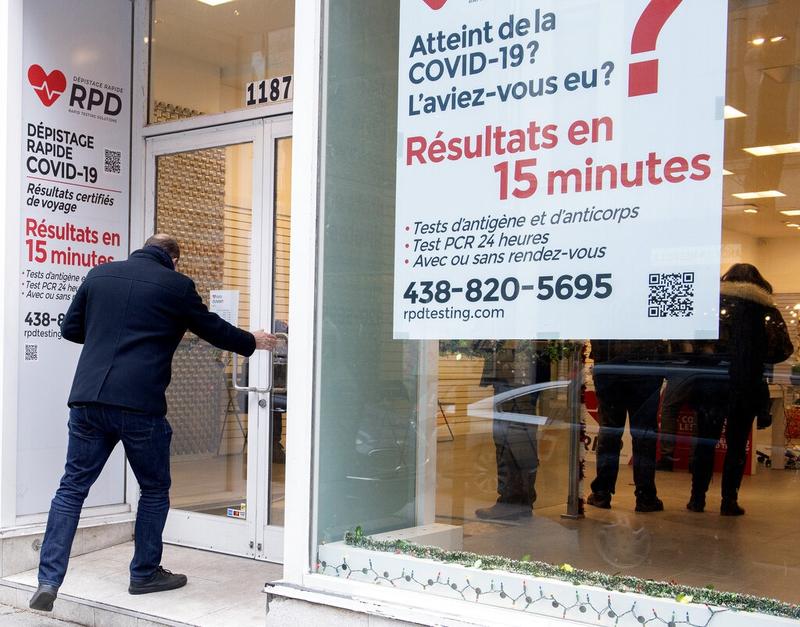 People enter a COVID-19 rapid testing business in Montreal on Dec 4, 2021. (GRAHAM HUGHES / THE CANADIAN PRESS VIA AP)
People enter a COVID-19 rapid testing business in Montreal on Dec 4, 2021. (GRAHAM HUGHES / THE CANADIAN PRESS VIA AP)
Canada
COVID-19 cases are continuing to soar across Canada fueled by the Omicron variant, with confirmation of 7,566 new cases as of Saturday afternoon.
The new cases brought the cumulative caseload to 1,874,473, including 30,040 deaths, according to CTV news.
The country's populous provinces, Ontario and Quebec, each reported more than 3,000 new cases.
One day after setting a pandemic record for daily cases, Quebec reported 3,631 new infections and two deaths and a surge in hospitalizations in its latest numbers while Ontario confirmed 3,301 new cases and four additional deaths.
The surge is being seen in other provinces as well.
For the third day in a row, Nova Scotia province reported a new record high single-day COVID-19 case increase, with 426 new infections announced Saturday. The previous record for a single-day case increase was on Friday when 394 new cases were reported.
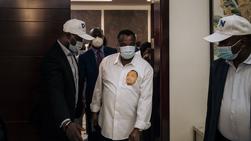 In this March 23, 2021 photo, the Republic of Congo's re-elected President Denis Sassou Nguesso celebrates the election results with his entourage and campaign team at the headquarters of the ruling Congolese Labor Party (PCT) in Brazzaville. (ALEXIS HUGUET / AFP)
In this March 23, 2021 photo, the Republic of Congo's re-elected President Denis Sassou Nguesso celebrates the election results with his entourage and campaign team at the headquarters of the ruling Congolese Labor Party (PCT) in Brazzaville. (ALEXIS HUGUET / AFP)
Congo
President of the Republic of the Congo Denis Sassou Nguesso is currently observing self-isolation after being in contact with COVID-19 patient, the Congolese government announced on Saturday, noting that the president tested negative for COVID-19.
The president is "required to observe a period of self-isolation," after "several close members of the president's entourage recently tested positive for COVID-19," the Congolese government said in a statement, reaffirming the president has tested negative.
The Congolese president "exercises his functions in the fullness of the competences devolved to him by the Constitution and continues to work with various institutions" of the country, said the Congolese government.
ALSO READ: Study: Omicron more likely to reinfect than Delta, no milder
Cuba
Cuba reported its first death from COVID-19 this week and registered 77 new cases, bringing the death toll to 8,314 and the number of infections to 964,035, the Ministry of Public Health said on Saturday.
The ministry reported that 344 people are currently hospitalized with active cases of the disease.
 A rapid coronavirus test is taken in a temporary facility outside a pharmacy in Lakatamia a suburb of Nicosia, Cyprus on Dec 13, 2021. (PETROS KARADJIAS / AP)
A rapid coronavirus test is taken in a temporary facility outside a pharmacy in Lakatamia a suburb of Nicosia, Cyprus on Dec 13, 2021. (PETROS KARADJIAS / AP)
Cyprus
Cyprus' new restrictions on travel from the United Kingdom came hurriedly into force on Saturday after a rapid spread of Omicron variant infections related to that country, the Health Ministry said in a statement.
The ministry said that the measures were due to the rapid increase in cases of the COVID-19 Omicron variant in the UK.
Ministry sources said that health officials were forced to act without a prior announcement as they were worried over the possibility of a large number of Omicron cases among Cypriot university students and UK Cypriots who arrive for the Christmas and New Year Holidays.
The statement said that all passengers over 12 years of age who arrive from the UK, and irrespective of their vaccination status, will have to stay in strict self-isolation in their residence until the result of an airport PCR test for the coronavirus is issued.
All UK passengers will be given a self-test package of five units for the purpose of making a self-test on five consecutive days in case their airport test was negative.
Egypt
Egypt confirmed its first three cases of COVID-19 Omicron variant, the Health Ministry announced late on Friday.
Two of the cases are not showing any symptoms, while the third suffers mild symptoms, the ministry said in a statement.
The three cases were isolated in hospitals, and all precautionary measures were taken for those in contact with them, it added.
The total number of COVID-19 cases in Egypt reached 373,509, including 21,277 deaths, according the ministry.
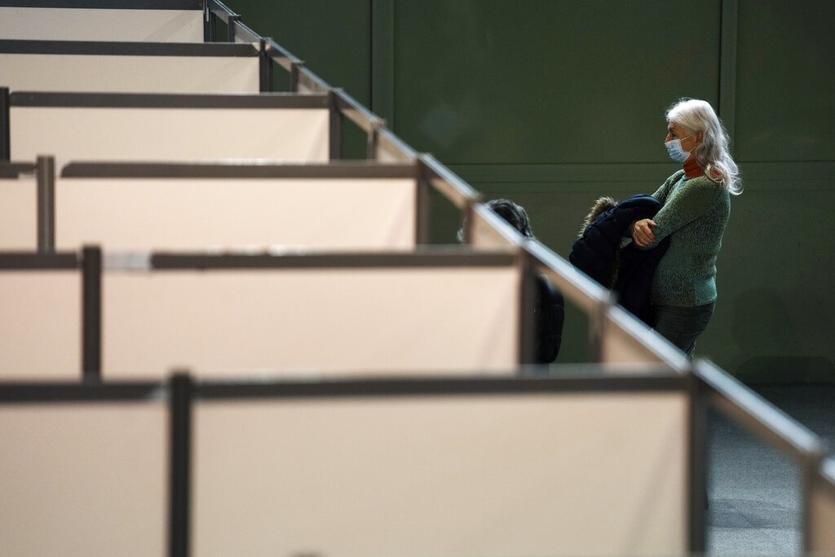 A woman waits to receive Pfizer's COVID-19 vaccine at a vaccination site, in Fontainebleau, south of Paris on Dec 6, 2021. (THIBAULT CAMUS / AP)
A woman waits to receive Pfizer's COVID-19 vaccine at a vaccination site, in Fontainebleau, south of Paris on Dec 6, 2021. (THIBAULT CAMUS / AP)
France
France hopes that a planned new vaccine pass that will be required to enter public places will persuade more people to get inoculated against COVID-19 as the country faces a rapid spread of the Omicron variant, the health minister said on Saturday.
The government does not want to impose new curfews or lockdowns on people who have been vaccinated, but the threat of Omicron means authorities have to increase pressure on those refusing vaccination, Olivier Veran said on France Inter radio.
"We cannot continue to say that the choice of not getting vaccinated is a choice that has no consequences," Veran said.
Prime Minister Jean Castex said on Friday the government will propose a bill in parliament in January to change France's "health pass" into a "vaccine pass", meaning only vaccinated people will be allowed to enter indoor public places such as bars, restaurants and cinemas. read more
Under current regulations, a recent negative COVID-19 test or proof of vaccination suffices.
About 90 percent of eligible French people have been vaccinated, according to the government.
Veran said the government would ask MPs to also consider making the vaccine pass a requirement on trains and planes, and to make it mandatory to show a proof of identity along with the pass. "There is too much fraud," he said.
Veran said Omicron was currently suspected to account for up to 10 percent of new coronavirus cases and that could rise to more than 50 percent early next year.
Veran also said he expected that next week France's health authority will approve vaccination for children aged 5 to 11.
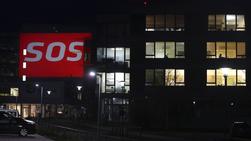 An SOS message can be read on the facade of the Ostallgoeu-Kaufbeuren hospitals in Kaufberen, Germany on Dec 5, 2021 to draw attention to the critical situation in the hospitals due to the COVID-19 pandemic. (KARL-JOSEF HILDENBRAND / DPA VIA AP)
An SOS message can be read on the facade of the Ostallgoeu-Kaufbeuren hospitals in Kaufberen, Germany on Dec 5, 2021 to draw attention to the critical situation in the hospitals due to the COVID-19 pandemic. (KARL-JOSEF HILDENBRAND / DPA VIA AP)
Germany
Germany will impose quarantine on travelers from Britain from midnight on Monday and require a negative COVID-19 test for entry into the country, the Robert Koch Institute for infectious diseases said on Saturday.
Germany's regional health ministers had urged the national government on Saturday to introduce tougher rules on people arriving from Britain, where the Omicron coronavirus variant has sparked a surge in infections.
At a meeting, the ministers called on Berlin to classify Britain as a virus-variant area, enforcing a two-week quarantine on all travelers including those who are vaccinated.
"The spread of Omicron in the UK is very evident. ... We have to prevent the spread for as long as possible and slow it down as much as possible," the ministers said in a statement.
Infections rose steeply in Germany through October and November, but have been slowly falling since December, with 50,968 reported on Friday.
Italy
Italy's government is considering new measures to avoid a surge in COVID-19 infections during the holiday period, local newspapers reported on Sunday, amid worries over the spread of the highly contagious Omicron coronavirus variant.
After holding a meeting with ministers on Dec 23, Prime Minister Mario Draghi could impose an obligation on the vaccinated to show a negative test to access crowded places, including discos and stadiums, daily Corriere della Sera reported.
Negative tests could also be required to enter cinemas and theatres, along with wearing masks outdoors.
Under current rules, people who have been vaccinated or have recently recovered from the disease have free access to indoor seating at bars and restaurants, museums, cinemas, clubs and sporting events.
ALSO READ: First person dies from Omicron variant in United Kingdom
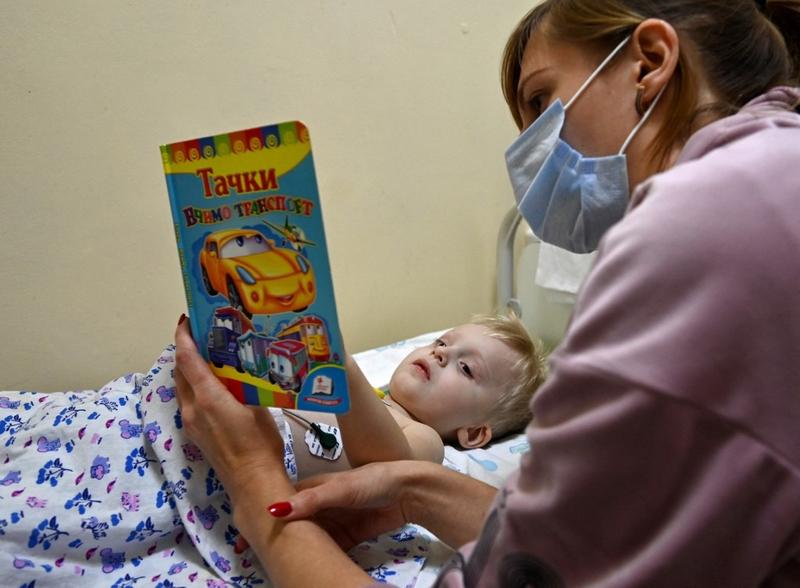 A woman reads a book to her son suffering from the coronavirus disease in an intensive care ward of a children's hospital in Kyiv on Nov 16, 2021. (SERGEI SUPINSKY / AFP)
A woman reads a book to her son suffering from the coronavirus disease in an intensive care ward of a children's hospital in Kyiv on Nov 16, 2021. (SERGEI SUPINSKY / AFP)
Ukraine
Ukraine has detected its first case of the Omicron coronavirus variant, Health Minister Viktor Lyashko said on Saturday.
The infected person recently returned to Ukraine from the United Arab Emirates, Lyashko said on Facebook.
So far Ukraine has reported 3.6 million cases of COVID-19 and 92,929 deaths.
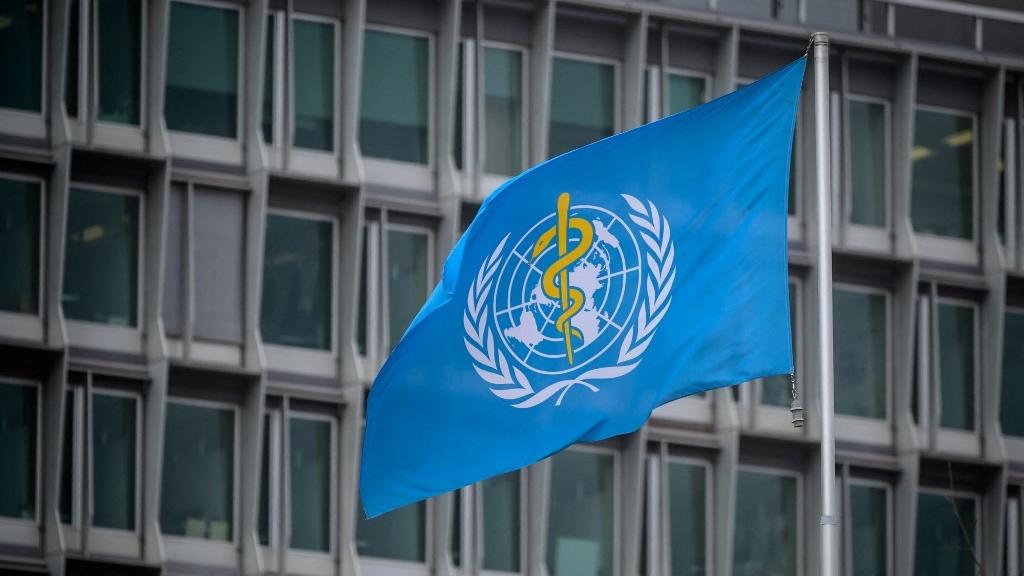 This photograph taken on March 5, 2021 shows the flag of the World Health Organization at their headquarters in Geneva amid the COVID-19 outbreak. (FABRICE COFFRINI / AFP)
This photograph taken on March 5, 2021 shows the flag of the World Health Organization at their headquarters in Geneva amid the COVID-19 outbreak. (FABRICE COFFRINI / AFP)
WHO
The Omicron coronavirus variant has been reported in 89 countries and the number of cases is doubling in 1.5 to 3 days in areas with community transmission, the World Health Organization said on Saturday.
Omicron is spreading rapidly in countries with high levels of population immunity, but it is unclear if this is due to the virus' ability to evade immunity, its inherent increased transmissibility or a combination of both, the WHO said in an update.
The agency designated Omicron a variant of concern on Nov 26, soon after it was first detected, and much is still not known about it, including the severity of the illness it causes.
"There are still limited data on the clinical severity of Omicron," the WHO said. "More data are needed to understand the severity profile and how severity is impacted by vaccination and pre-existing immunity."
It added, "There are still limited available data, and no peer-reviewed evidence, on vaccine efficacy or effectiveness to date for Omicron".
The WHO warned that with cases rising so rapidly, hospitals could be overwhelmed in some places.
"Hospitalizations in the UK and South Africa continue to rise, and given rapidly increasing case counts, it is possible that many healthcare systems may become quickly overwhelmed."


